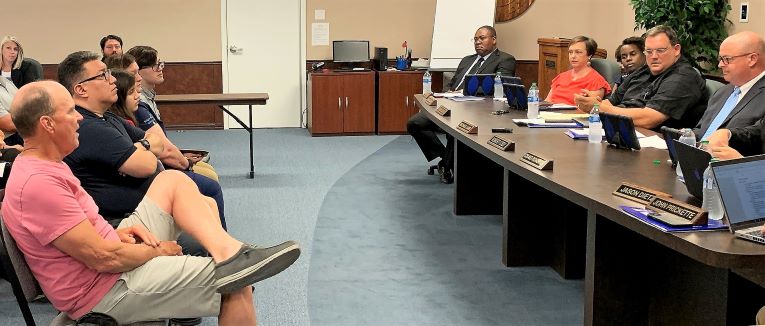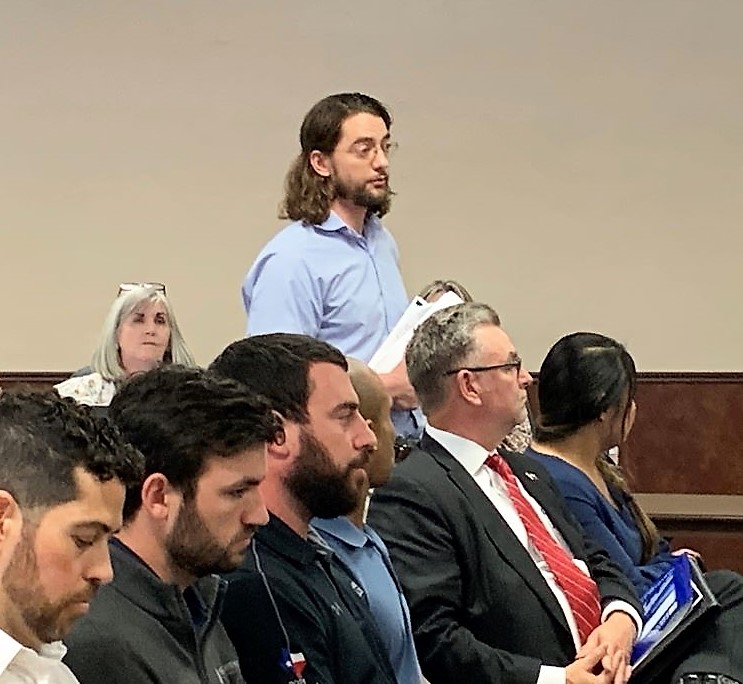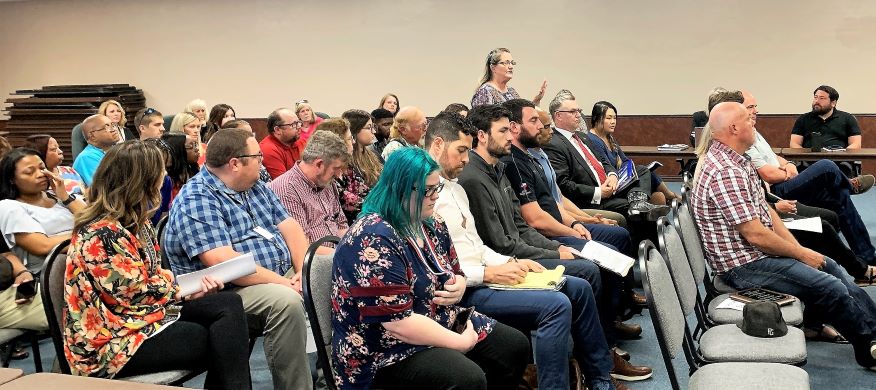Developer, Land Owner Asks School Board to Amend Agreement As Requested
Citizens asked Sulphur Springs ISD trustees this week to reconsider the district’s stance on 313 agreements, particularly amending the agreement with Hopkins Energy LLC. The developer and one landowner whose property is within the planned Hopkins Energy LLC area asked the board to approve the amended agreement.

Ryan Economy, developer for Hopkins Energy solar project parent company ENGIE North America, noted that the amendment simply asks the district to push back by the end date of construction and start date of the value limitation period by one year. He said the plan is to begin construction on the project later this year, with construction continuing into next year.
“We have over the last year been through extensive studies of our sight for wetlands and other factors that go in our design, specifically and very importantly civil engineering and water plans that are required by state so looking forward we can finalize our storm water permit,” Economy said, advising the school board that their responsibilities are to the school, funding, students, and success of those students.
Economy contended that determining zoning and environmental issues are not the job of the school. Those belong to the Commissioners Court and state.
“In the state of Texas, landowner rights prevail, and so landowners may do what they wish on their private property whether that be grazing cattle, capturing sunlight or raising crops,” Economy said. “So, I am here today requesting for you to simply extend the agreement we already have in place. That funding comes out to the net benefit of the school district of about $1.3 million aside.”
Economy said the agreement benefits both the school district and company. The company gets a break on school district maintenance and operations taxes in accordance with the terms of the agreement and supplemental payments and revenue loss payments of up to about $1.3 million to the district.
The request to extend the time dates for tax incentives for the planned Dike solar facility is the second amendment made for the project, which has changed hands since the original request was made a few years ago and has reduced somewhat in size. No construction has yet begun on the project, located in both Sulphur Springs and Dike school districts.
Cynthia Martin, whose property backs up to the planned solar facility, sought legal action to bar the plant from being located in Dike. So far, those requests have been denied in local court, but efforts continue legally and through the local grassroots collective Save Dike From Solar, which represents “hundreds of citizens” in Dike community who are opposed to “ENGIE’s industrial solar complex.”
Save Dike From Solar spokesperson Michael Pickens said the planned project is in a forested wetland. State Senators Brian Hughes and Bob Hall, as well as other elected officials, have voted down the 313 agreements. New 313 agreements cannot be made after Dec. 31, 2022.
“As Senator Bob Hall said, ‘I am dedicated to ending Chapter 313 tax abatements which increase the property taxes of citizens in order to pay for property taxes of corporations through a crumby capitalistic program,'” Pickens said. “There’s a whole bunch of news articles on this 313 program that is facing so much opposition in the Texas Senate and the communities around the state of Texas.

Pickens contends that the 313 program and allowing the solar facilities to be built in rural areas will lower property values of nearby properties in Dike next to the power plant. He said another reason Hall and Hughes are opposed to it is that school districts do not receive the additional funds promised to them by the solar operations while making “tons of money” for the solar companies.”
Besides that, Pickens noted, ENGIE – the parent company for Hopkins Energy LLC – is a French company. Before that, Alpine Sun, the company who originally proposed the agreement then sold it to ENGIE is a German company.
“So, our argument is that our land values are being depreciated, our lands will be environmentally impacted negatively for a French company to make lots of money,”
Michelle Barnes, Dike resident, said she did not know about the planned solar project when she moved to Dike 2 years ago, but is opposed to it.
“The one thing I’m concerned about is the devastation to the environment out there. I’ve already looked at the Stampede Solar project out in Saltillo where they are building big ditches for the water retention,” Barnes said. “Well, if you’re going to be building all of these retention ponds all over the place – this is 18 hundred and 50 acres out in the Dike area – you’re going to change the environment that we live in, because that water is no longer running off to where it’s supposed to go like it has been in past years. That is going to change everything for everybody there.”
Barnes said her research of the solar project in Cunningham, Texas, just 21 miles from Dike, developers have panels up but haven’t begun operations yet. She said she’s been told that’s due to lack of funding. Property values around the Cunningham project went up 9.1% the first year the farm was installed.
“So not only are we not going to be able to sell our homes because we live right next to a solar power plant, but we are going to be paying more in taxes because our assessed values are going to go up because we now live in a jurisdiction that has commercial property and and not rural agriculture,” Barnes concluded.
While Pickens and Barnes expressed opposition to the planned Dike solar facility, Tim Fuller is in favor of the project. He has land located within the planned Hopkins Energy LLC and knows the owners of the other parcels of land on which the solar projects are to be located.
“I just don’t think folks needs to be messing with what I do with my land. It’s my land. I should be able to put solar panels on it if I want. I think in our environment, that’s what we’ve got to get to. We need other things than fossil fuels, so I would like you to extend the contract,” Fuller said.
Garret Peters with KE Andrews, tax consultant for Hopkins Energy for ENGIE, said 313 programs have been highly successful.
“The fact that this company is going to save millions and millions and millions of dollars is not the truth. Just in this district alone, it’s a 90 million dollar investment. On that, over 15 years, they save $935,000. So we’re not talking about massive corporate welfare that’s going to change the balance sheet and the income statement of ENGIE, a global company, significantly,” Peters said.
All Texas property owners have seen an increase in their home and land appraisal values over the last year. An increase of 9.1% would be at the lower end of the increases. Peters said the property tax bill on his residential property in Rockwall went up 34%.
“I don’t believe that this is going to be a significant effect on any surrounding land. There’s been studies that kind of go either way on this topic of being close to solar plants. Without it being a major residential subdivision backing up to this, I don’t think it’s going to be a contributing factor to value,” Peters said.
Because the Comptroller’s office has certify the 313 agreements as qualifying for the tax incentive, an amended application was submitted to and approved by the Comptroller’s Office on April 28.
I truly understand your situation of adjacent land owners, but the school board is not the place to argue the legalities of this issue. If the state of Texas and all the laws and zoning committees make it legal for a landowner to do something with their land, it is by no means the purview of the school board to dictate what a landowner does with their land as long as it’s abiding by the laws of the state,” SSISD Board of Trustees Secretary Jason Dietze said. “And, if it weren’t, it’s still not the school board’s purview to do that. Our purview is to look at opportunities that benefit students and the district. To be honest, for me, it’s a no brainer the benefit that it is to our district financially to approve these type of agreements.
Following the public hearing with citizens comments during the May 9, 2022, SSISD Board of Trustees meeting, the school board, as is required, declared no conflict of interest in the proposed agreement for the Chapter 313 tax limitation for Hopkins Energy LLC. The amended agreement puts the start of the tax limitation period for the Chapter 313 agreement at Jan. 1, 2024, and end of it on Dec. 1, 2033. the final termination of the agreement would be Dec. 31, 2038, the last year of the limitation period plus 5 years.
“Again, I truly empathize with you. If I lived next door to one, I might have the feelings that you have. However, the school district is not the place to really confirm or condemn those actions. We don’t have the legal authority to do that. There’s a loophole authority, in that if we were to vote against it, it might negatively affect the project. However, that’s not the purview of the school board – what is best for the students financially, what’s best for the district financially is. We keep getting these and we keep getting the negative reflection on that. That is not the school board’s place. These may have fairly legitimate arguments but it’s not to be made before the school district. It’s to be made before your zoning committees, your state legislators,” Dietze concluded, just prior to the school board’s vote on the requested amendment.
SSISD Board of Trustees voted to grant the amendment adding the extra time for the start and completion of the project as well as bumping the value limitation period an additional year.
Value limitations in 313 apply to the M&O portion of the school tax rate. Beneficiaries granted limitations, in this case the solar company, will still be required to pay the taxes for the I&S (debt service) portion of the school tax rate, school trustees confirmed.







